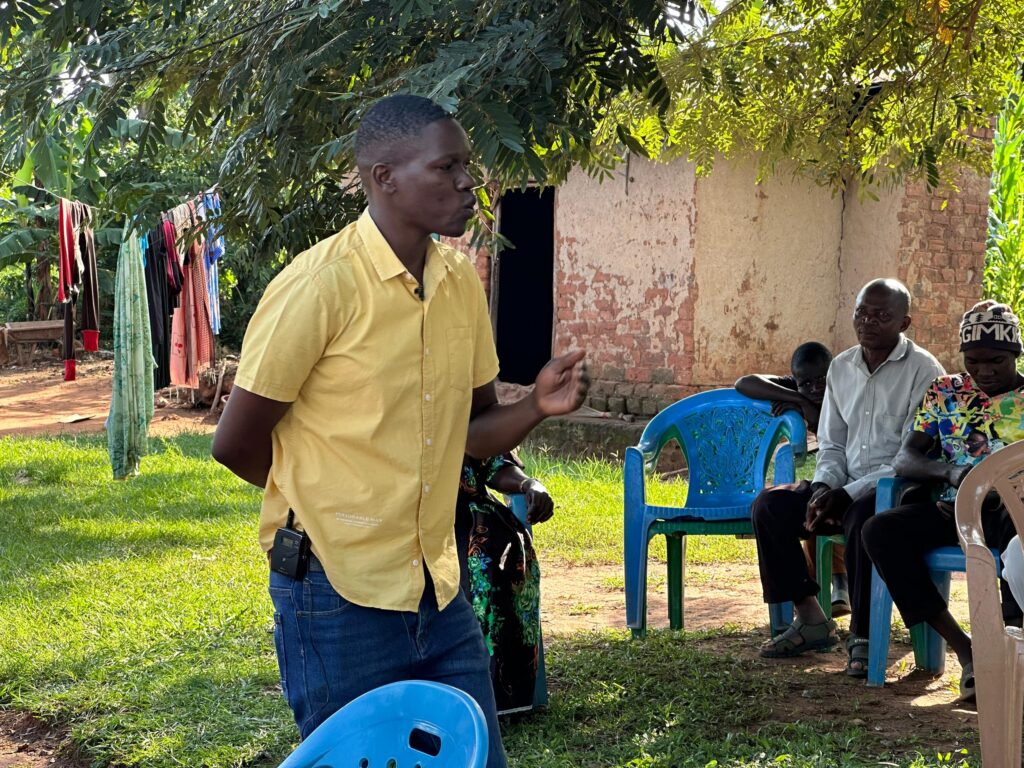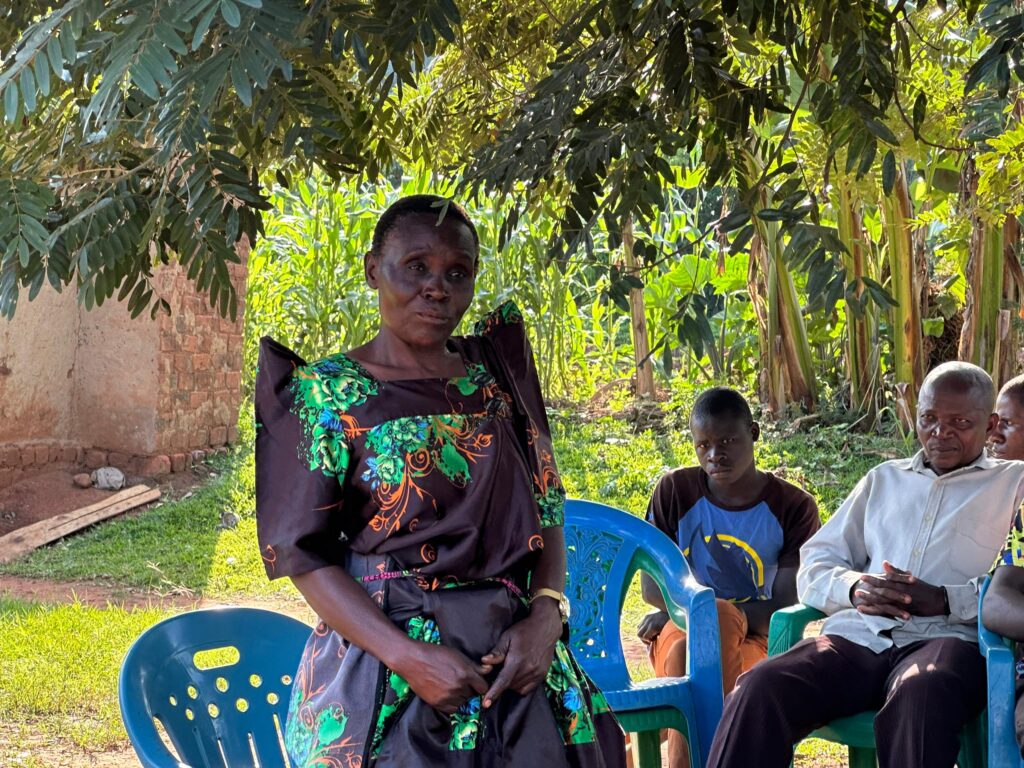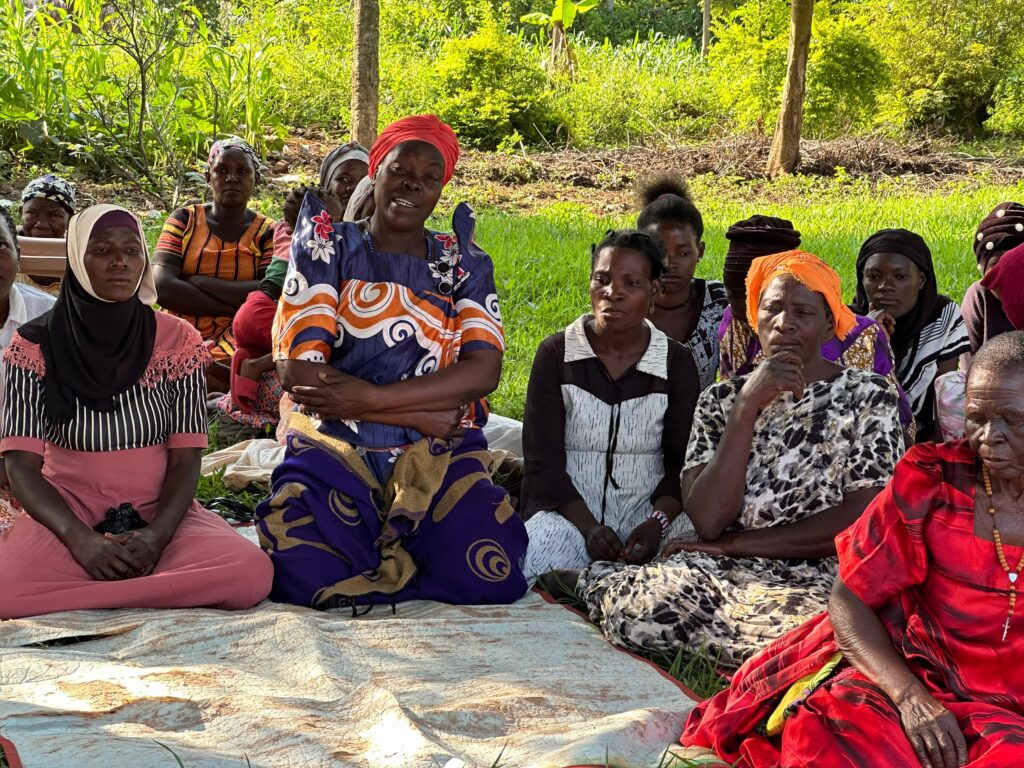From Complaints to Action:
Mentors Help Jinja Residents Demand Better Services
Written by: Vanessa Namukwaya| Photography by Winter Muganzi
Written by: Vanessa Namukwaya| Photography by Winter Muganzi
On a sunny afternoon, members of Kiranga Bususwa village gather under a tree shed at their community leader’s compound.
It is now part of the community tradition to constantly dialogue over what they define as the village’s ‘pressing issues’.
Conversations here usually stretch from the endemic clean water problem, to the impassable roads, to security among others.
“Its here that we get to know who the leaders responsible and the channels through which we can approach them to ensure that our concerns get to the relevant authority at sub county or district level,” says Micheal Erumuka, the civic mentor of this community.

Micheal Erumuka, a civic mentor speaks with community members in Bususwa village, Jinja district.
Edith Nagaiga the community chairperson says the community dialogues have made her community appreciate civic responsibility and this creates a clear ground on what should be done and how it should be done.
“When people sense that you are on the same level with them, and you are trying to understand them, trust from them will never be an issue,” says Naigaga.
Uganda runs a decentralized government structure which is a blend of national and local government systems. The national level includes the Executive, Legislature, and Judiciary.

Edith Naigaga, the community leader of Bususwa. Photo by Winter Muganzi.
At local district level governance is designed in a five-tier structure of elected councils, including the Local Council (LC1): One at village level, Two at Parish Level, three at subcounty level, four municipal level in urban areas, and five at district level.
Though it has been praised as an inclusive governance system, accountability is still a challenge as governance structure faces significant challenges including corruption, and issues related to decentralization.
These challenges hinder effective public service delivery, economic growth, and social progress.
Uganda’s record on holding politicians accountable over the past years is mixed despite the country having mechanisms for accountability, such as parliament’s oversight role and anti corruption , there are concerns about their effectiveness
Many Ugandans lack knowledge about district councils, which further hinders their ability to hold officials accountable.
This dynamic contributes to what the Ugandan Auditor General has called” poor local government performance” because much as there is the aspect of accountability.
The fear of holding those in power accountable is hard and this increases the risk of electing unworthy leaders which increases the dangers of poor leadership such as electing leaders who are not competent or accountable.
The Auditor General’s Office, a public transparency office has reported rampant cases of budget misappropriation, including payments to dead or ineligible beneficiaries, forged salary scales, unaccounted expenditures, and improper procurement practices
This has left many communities without basic services, yet there still lacks an accountability mechanism between citizens and their leaders.

A community member shares during a meeting. Photo by Winter Muganzi.
Erumuka who has been supporting communities to understand their responsibility is part of a broader network of civic mentors that have been placed in different communities to help communities make sense out of their situation.
The model is being led by Fabio, a local organization that uses bicycles to address community concerns.
The civic mentors work with communities to align their understanding of how governance works, and help them make informed voting decisions.
“These conversations help us understand our responsibility as citizens and the roles our leaders must play in the development of our community,” says Ivan Kisige, a local youth leader that is working to ensure that promises made by leaders meet the community’s expectations.
For these mentors, the mandate aligns with having a conversation with the locals and teaching them which is an added advantage because these conversations help to understand people’s perspective on leadership, then it helps to shape these perspectives and thinking into something meaningful.
“When we dive into conversation with the locals as fabio , we understand their grievances and we forward these worries to the people in charge, especially the Electoral Commission” says Erumuka.
Ignorance, Empathy and fear are some of the few things that always hinder locals from seeking accountability or worst of all stay away from politics.
Citizen engagement in holding leaders accountable varies, some success seen in holding local politicians accountable through information dissemination and citizen participation in monitoring budgets.
However, border issues of police brutality, corruption,intimidation from the people in power and limitations on freedom of assembly hinder the full realization of accountability and safety to the natives.
Understanding who to vote in most cases is hard for the locals, especially the illiterate in rural areas because of the unseen manipulation encompassed with the election season.
Without proper civic education, voters might not understand the qualities of a good leader such as integrity, vision and commitment to public service especially the leaders who always want a second term in office.
Enumuka attributes this to the fact that it is very important to understand and listen to the opinion from the natives which creates an understanding of what is not seen or heard but witnessed by the locals.
This enables the organisation to forward the information obtained and the different concerns to the people in charge, especially the electoral commission.
“Fabio gets people’s opinion and helps to shape them and proceeds to forward them to the people in charge” says Micheal.
Kisige says the model is helping his community to understand how best they can make their leaders to account, and support them in making sense of civic duties that can move the community forward.
When it comes to their leaders is something that should be given more attention “ we used not to think about what happens after we elect these leaders into power and in most cases we would hear from them after their time in office is done” says Ivan.
He urges the organisation to also avail lawyers to them in order for them to have a purse factor to their claims when it comes to failure of the leaders to account to their time in power when elected.
© 2022 - Media Challenge Initiative | All Rights Reserved .
© 2022 - Media Challenge Initiative | All Rights Reserved .